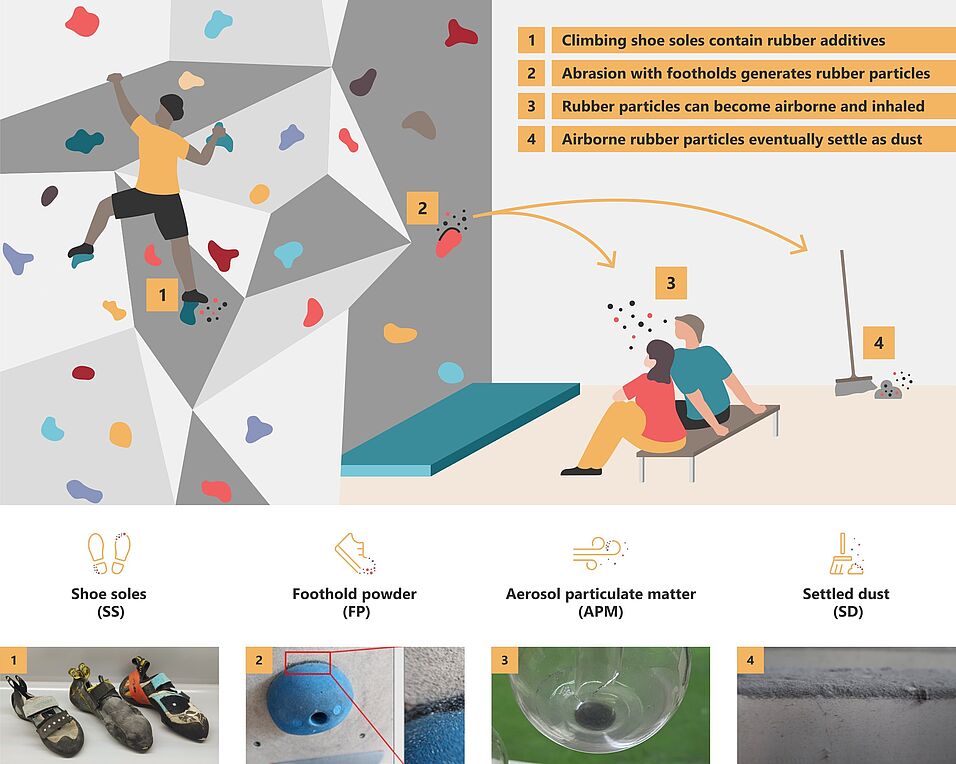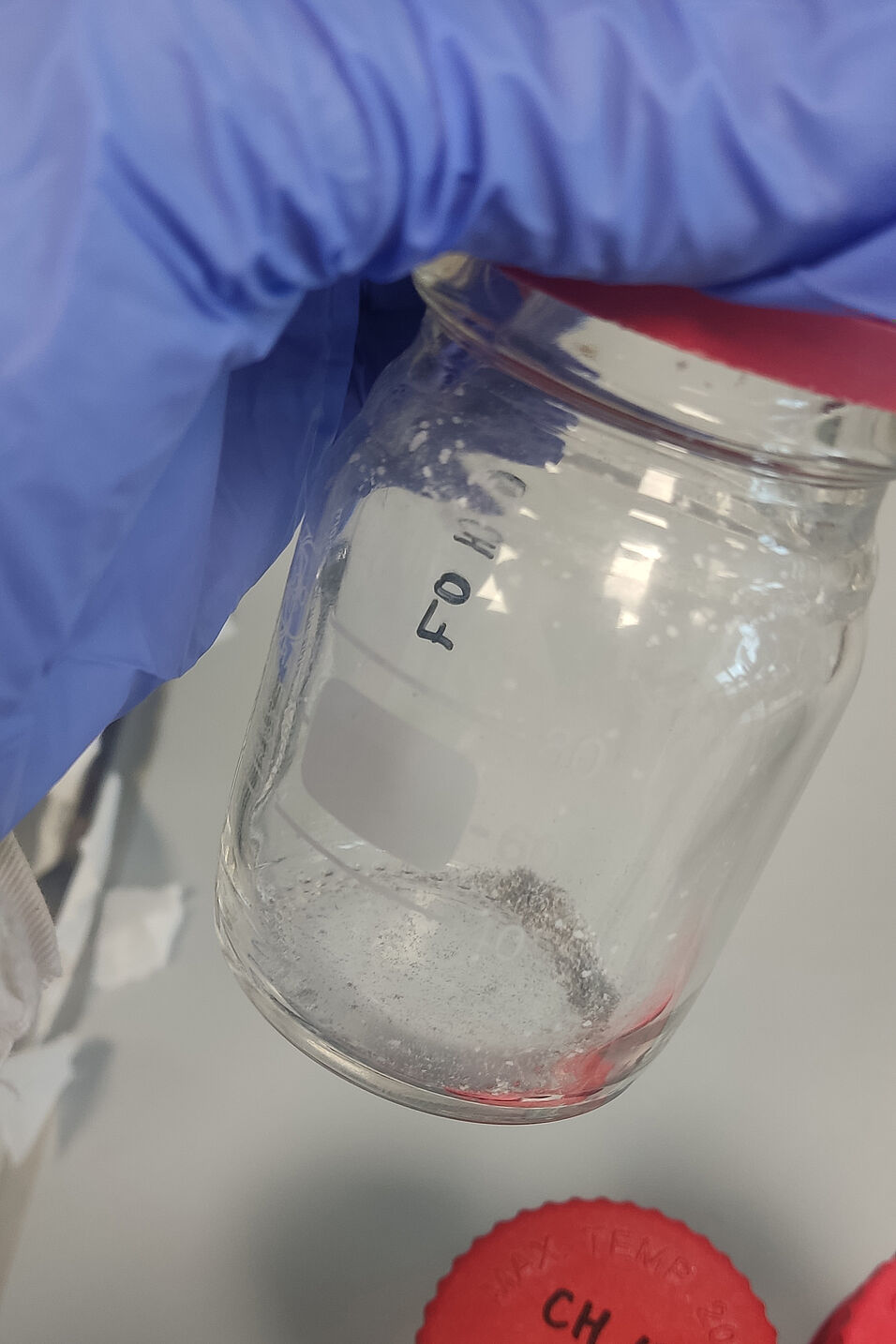A climbing hall is filled with a variety of smells: sweat, chalk dust - and a hint of rubber. A research group led by environmental scientist Thilo Hofmann at the University of Vienna has now discovered that rubber abrasion from climbing shoes can enter the lungs of athletes. The shoes contain rubber compounds similar to those used in car tires - including additives suspected of being harmful to humans and the environment.
"The soles of climbing shoes are high performance products, just like car tires", explains Anya Sherman, first author of the study and an environmental scientist at the Centre for Microbiology and Environmental Systems Science (CeMESS) at the University of Vienna. Additives are specific chemicals that make these materials more resilient and durable; they are essential for their function.
Sherman enjoys climbing herself - as a balance to her work in the lab and on the computer. At a conference, she met Thibault Masset from the École Polytechnique Fédérale de Lausanne (EPFL), who researches similar topics and also enjoys climbing. The two researchers and equal first authors of the study came up with the idea of testing the rubber from their own climbing shoes using the same scientific methods they use to analyze car tires. "We were familiar with the black residue on the holds in climbing gyms, the abrasion from the soles of our shoes. Climbers wipe it off to get a better grip, and it gets kicked up into the air", adds Sherman.
Equipped with an impinger, a particle-measuring device that mimics the human respiratory tract, Sherman, in collaboration with Professor Lea Ann Daily's research group, collected air samples in five bouldering gyms in Vienna. The impinger draws in air at a rate of 60 liters per minute and separates particles in the same way as they would enter the human lungs. Other dust samples for the study were collected in collaboration with the EPFL Lausanne from bouldering gyms in France, Spain and Switzerland.
"Air pollution in the bouldering gyms was higher than we expected", says corresponding author Thilo Hofmann. What was striking was that the concentration of rubber additives was particularly high where many people were climbing in a confined space. Hofmann concludes: "The levels we measured are among the highest ever documented worldwide, comparable to multi-lane roads in megacities."
In 30 pairs of shoes tested, the team found some of the same pollutants as in car tires: among the 15 rubber additives found was 6PPD, a rubber stabilizer whose transformation product has been linked to salmon kills in rivers.
What this means for human health is still unclear. But Hofmann stresses: "These substances do not belong in the air we breathe. It makes sense to act before we know all the details about the risks, especially with regard to sensitive groups such as children."
Sherman also points out that the operators of the studied bouldering gyms were very cooperative and showed a high level of interest in improving the air quality in their gyms. "This constructive cooperation should lead to the creation of the healthiest possible climbing hall environment, for example through better ventilation, cleaning, avoiding peak times and designing climbing shoes with fewer additives."
"It is essential to switch to sole materials with fewer harmful substances," says Hofmann. He says manufacturers are currently not sufficiently aware of the problem. The rubber they buy for their soles contains a cocktail of undesirable chemicals. More research is needed to understand how these substances affect the human body. Anya Sherman remains motivated: "I will continue to climb, and I am confident that our research will contribute to better conditions in climbing gyms."
Links
- Read the Full Paper in ES&T Air: https://pubs.acs.org/doi/10.1021/acsestair.5c00017
- Watch Video Interview with Thilo Hofmann and Anya Sherman: www.youtube.com/watch (English)
- Article in "Der Standard": https://www.derstandard.at/story/3000000267441/abrieb-von-kletterschuhen-sorgt-fuer-bedenkliche-luft-in-kletterhallen (German)
- Interview with Thilo Hofmann in "FAZ": https://www.faz.net/aktuell/wissen/schadstoffe-aus-den-gummisohlen-der-kletterschuhe-110447208.html (German)
- Article in "ORF Tirol": https://tirol.orf.at/stories/3302681/ (German)
- Article in "Kurier": https://kurier.at/wissen/gesundheit/kletterschuh-abrieb-bouldern-atemluft-gummi/403036570 (German)
- Article in "KroneHit": https://www.kronehit.at/news/dicke-luft-in-boulderhallen/ (German)
About ECH
Thilo Hofmann is Professor of Environmental Geosciences at the Centre for Microbiology and Environmental Systems Science and co-director of the Environment and Climate Research Hub at the University of Vienna. This network brings together researchers from a wide range of disciplines to produce excellent scientific knowledge that can provide solutions to pressing problems such as climate change, biodiversity loss and environmental pollution.
Link Homepage: ech.univie.ac.at




